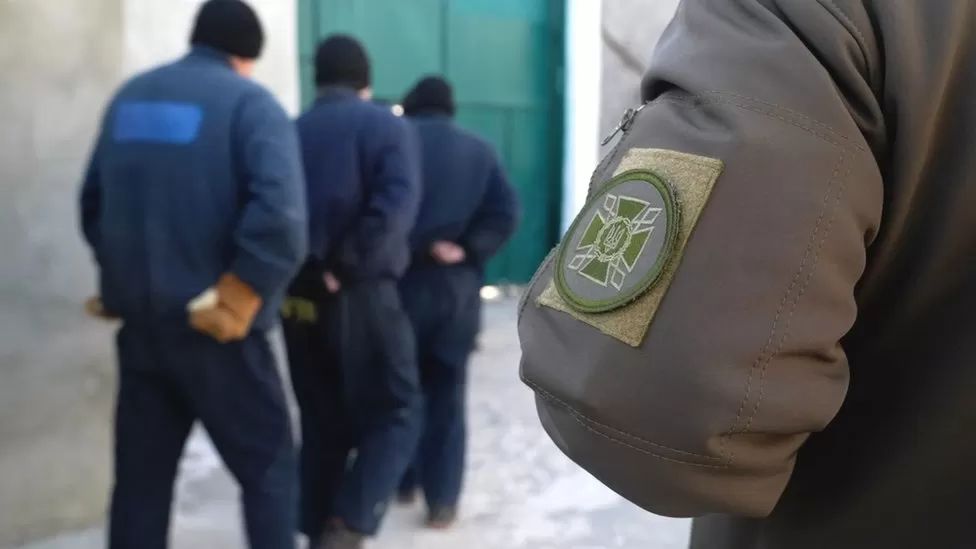Inside a prisoner of war camp for Russians
16 February, 2023

Russian missiles were once again taunting Ukraine from the sky as we entered this prisoner of war facility in the west of the country.
Hundreds of captured Russian soldiers, conscripts, and mercenaries are held in these gritty buildings - one of 50 sites around Ukraine where they are detained.
The crump of Ukrainian air defences could be heard in the distance as we were led into a basement, to be met with the sight of dozens of prisoners taking shelter from the Russian attack.
Prisoner exchanges have become a regular feature of this war and for Kyiv it is crucial that they continue. Ukraine said this month it had secured the release of 1,762 men and women so far in prisoner swaps. These are highly sensitive operations, often taking months to arrange.
Under the Geneva Conventions, prisoners of war must not be paraded or exposed to the public.
We were allowed to approach who we wanted and asked for their consent. But the guards were with us wherever we went and these men were unlikely to have been speaking freely.
Many hid their faces to further protect their identities.
Last November, a UN human rights report documented abuses by both sides, based on interviews with prisoners who spoke of cases of torture and ill-treatment. Here the guards appeared keen to show they were treating the prisoners well. One fighter said he had been working for a mercenary group. He had been brought to this facility three days earlier, after he was taken prisoner near the eastern town of Soledar, captured last month by Russian forces.
A handful stared on defiantly. We met the gaze of one prisoner who said he was captured in the Luhansk region on 29 December.
"I hope I will be exchanged and that I won't have to go back into the army," he said.
"What if you have no choice?" I asked.
He paused for a second: "I have some ideas. I could come back by surrendering voluntarily."
Leaving the shelter it became clear that half the prisoners had been wounded.
Some had bandaged hands or feet. Others would move with a heavy limp.
One young man became emotional as he described how he had lost his leg in a grenade explosion.
As we approached the pulsing sound of a compression drill, a small production line came into view where prisoners of war were putting together outdoor furniture sets.
They worked, again with their heads down.
A local company had a contract with the facility, we were told, and that meant the inmates could make some money too, mostly to spend on cigarettes and sweets.
Most prisoners of war are compelled to have jobs like this. Apparently only Russian officers had a choice.
At lunchtime the prisoners were marched to a temporary canteen on the top floor. Through the window a Ukrainian flag flapped in the cold wind.
They ate quickly and in silence, but for the sound of eating. Then, table by table, in a moment of perfect choreography, they stood together and shouted in Ukrainian: "Thank you for lunch!"
Inmates here are made to watch TV in Ukrainian, including documentaries on Ukrainian history and the southern city of Mariupol, which was all but flattened by a Russian siege and bombardment that lasted for months.
Some of the Ukrainian soldiers who had defended Mariupol were part of the last exchange.
We asked one inmate whether he understood what he was watching.
"More or less," he said. "I find it educational." He was unlikely to have said anything unflattering.
It is quite possible that some of the Russians in the room could not understand the programme they were having to watch, and they may not have wanted to.
The prisoners are allowed one phone call every two weeks, according to the guards. For their families back in Russia these calls are often the first chance they have to find out their sons have been captured.
"Where are you? I've asked half the city about you!" one young man's mother could be heard over the phone.
"Mum, wait. I'm in captivity, I can't say more."
"With the bloody Ukrainians?" she said, before breaking down in tears.
"That's it, Mum. Quiet," he told her, as the guard stood over him. "The most important thing is that I'm alive and healthy."
Some of the prisoners' calls went unanswered, leaving them hoping for another chance on the phone - and a future prisoner swap.
Source: www.bbc.com
